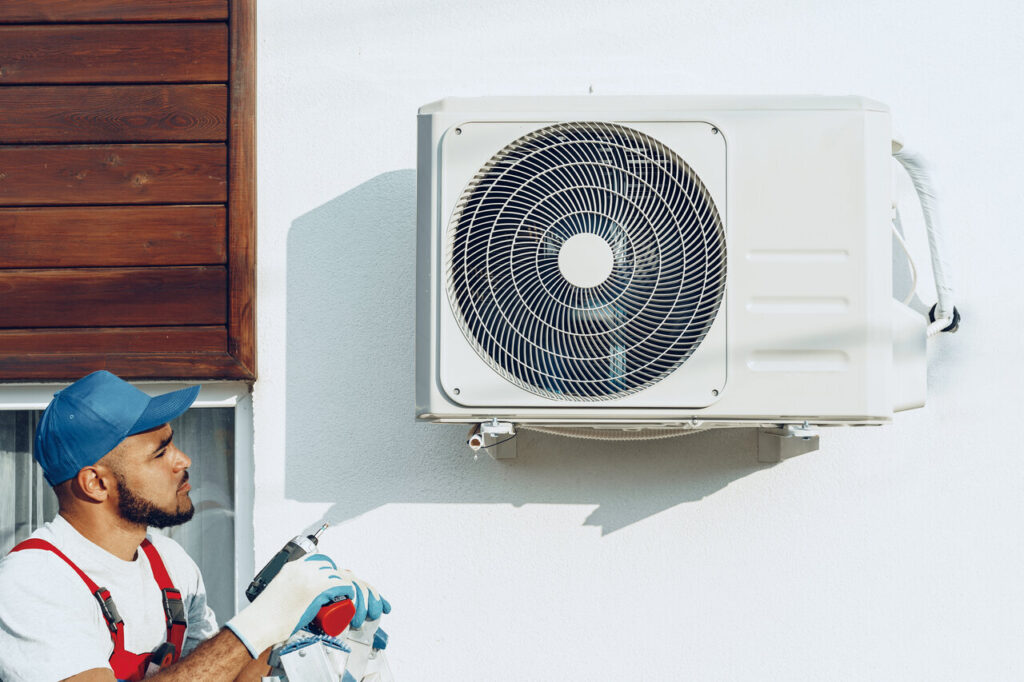Heat pumps have become increasingly popular among homeowners seeking a versatile and energy-efficient solution for their heating and cooling needs. These innovative systems can provide both heating and cooling by transferring heat from one place to another, offering year-round comfort and energy savings. However, ensuring optimal performance and longevity from your heat pump requires proper installation, maintenance, and timely repairs when necessary. As experts in heat pump installation, service, and repair, our professionals are here to guide you through every step of the process, from selection and installation to ongoing care and maintenance.
1. Understanding the Benefits of Heat Pumps: Why Choose a Heat Pump System?
Heat pumps offer several advantages for homeowners seeking an energy-efficient and versatile heating and cooling solution. Some key benefits include:
– Year-round comfort: Heat pumps can provide both heating and cooling by transferring heat from one location to another, ensuring consistent indoor comfort regardless of the season.
– Energy efficiency: By utilizing the existing heat in the air or ground, rather than generating heat from fuel combustion, heat pumps can operate with greater energy efficiency, reducing your utility bills.
– Decreased carbon footprint: As heat pumps rely on electricity rather than burning fossil fuels, they produce fewer greenhouse gas emissions, contributing to a more sustainable living environment.
– Low maintenance: With fewer moving parts than traditional HVAC systems, heat pumps typically require less maintenance and have longer lifespans when properly cared for.
Our technicians can help you assess the suitability of a heat pump system for your home, considering factors such as climate, home size, and existing heating and cooling infrastructure.
2. Key Factors to Consider When Selecting a Heat Pump System
With various types of heat pumps available, each with its own unique features and specifications, it’s essential to consider the following factors when selecting a suitable system for your home:
– Climate: The local climate is a crucial factor in determining the best heat pump type, as air-source heat pumps are most effective in milder climates, while geothermal heat pumps offer better performance in colder regions.
– Heat pump type: Air-source heat pumps, which transfer heat between indoor and outdoor air, are the most common variety, while geothermal heat pumps use underground temperature differentials for heating and cooling.
– Size and capacity: Proper sizing is essential for peak performance and energy efficiency. A heat pump that is too small or too large can lead to reduced comfort levels and higher utility costs.
– Efficiency ratings: Heat pumps are rated based on their Heating Season Performance Factor (HSPF) for heating and their Seasonal Energy Efficiency Ratio (SEER) for cooling. Higher ratings signify better efficiency and energy savings.
Our professionals can guide you through the process of selecting the right heat pump system that meets your specific needs while ensuring optimal performance, efficiency, and comfort.
3. Heat Pump Maintenance: Ensuring Optimal Performance and Longevity
Regular heat pump maintenance is critical to maintain optimal performance, extend the lifespan of your system, and prevent costly repairs. Some essential maintenance tasks include:
– Regular filter checks: Inspect your heat pump’s air filters at least once a month and replace or clean them as needed to ensure efficient airflow and improved indoor air quality.
– Annual tune-ups: Schedule a professional heat pump tune-up annually to inspect and clean all system components, including coils, fans, and electrical connections.
– Check refrigerant levels: Low refrigerant levels can reduce the efficiency of your heat pump and cause damage to the compressor. Our technicians can check and replenish refrigerant levels as needed.
– Inspect and clean outdoor unit: Keep the outdoor unit free from dirt, debris, and vegetation that can impede airflow and reduce efficiency.
Our professionals offer comprehensive heat pump maintenance services, providing thorough inspections, cleaning, and adjustments to ensure your system operates at peak performance.
4. Heat Pump Repair and Replacement: Know the Warning Signs
Timely heat pump repairs and, when necessary, replacement can help you avoid more significant issues and costly expenses down the line. Watch out for the following warning signs that may indicate the need for professional repair or replacement:
– Decreased efficiency and performance: If you notice a decrease in your heat pump’s heating or cooling capabilities or a sudden increase in your energy bills, it may require repairs or replacement.
– Strange sounds or odors: Unusual noises, such as grinding or squealing, or unpleasant odors can signify damaged or failing components within your heat pump system.
– Frequent cycling or system shutdowns: If your heat pump is frequently cycling on and off or shutting down completely, it can indicate issues with the thermostat, refrigerant levels, or other components.
Our technicians are skilled in diagnosing and repairing common heat pump issues, offering prompt and reliable service to ensure your home’s comfort and efficiency.
Conclusion
Heat pump systems offer an efficient and versatile heating and cooling solution for homeowners seeking year-round comfort and energy savings. By understanding the benefits of heat pumps, selecting the right system for your home, and adhering to regular maintenance and repair practices, you can ensure optimal performance and longevity. When you need expert guidance and support for your heat pump system, trust our professionals at Santana Air Inc for knowledgeable and dependable service every step of the way. Contact us to learn more about our heating and AC services in San Fernando.










